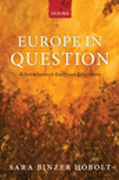
How do voters decide in referendums on European integration? Direct democracyhas become an increasingly common feature of European politics with importantimplications for policy-making in the European Union. Attempts to reform the EU treaties have been stalled, and even abandoned, due to no-votes in referendums. Europe in Question sheds new light on the pivotal issue of electoral behaviour in referendums and provides a major contribution to the study of democracy in the European Union and voting behaviour more generally. Hobolt develops a comprehensive theoretical framework for understanding voting behaviour in referendums and presents a comparative analysis of EU referendums from 1972 to 2008. To examine why people vote the way they do, the role of political elites and the impact of the campaign dynamics, this books relies on a variety of sources including survey data, content analysis of media coverage, survey experiments, and elite interviews. The book illustrates the importance of campaign dynamics and elite endorsements in shaping public opinion, electoral mobilization and vote choices. Referendums are often criticized for presenting citizens with choices that are too complex and thereby generating outcomes that have little or no connection with the ballot proposal. Importantly this book shows that voters are smarter than they are often given credit for. They may not be fully informed about European politics, but they do consider the issues at stake before they go to the ballot box and they make use of the information providedby parties and the campaign environment.
- ISBN: 978-0-19-954994-8
- Editorial: Oxford University
- Encuadernacion: Cartoné
- Páginas: 304
- Fecha Publicación: 01/05/2009
- Nº Volúmenes: 1
- Idioma: Inglés
